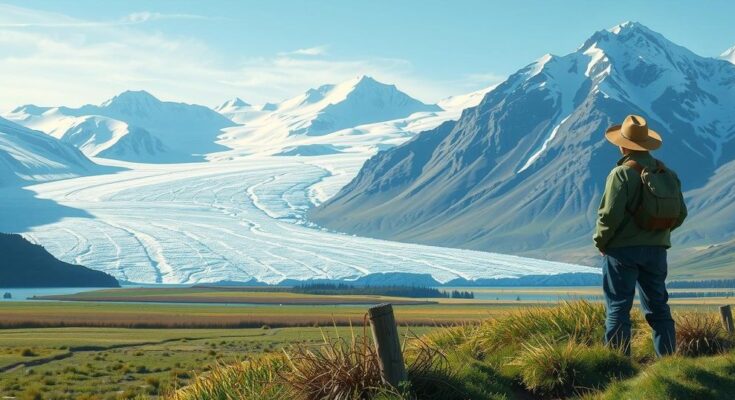Saul Luciano Lliuya, a Peruvian farmer, is suing German energy firm RWE for its alleged role in climate change that is causing glaciers in the Andes to melt and increase flood risks. The case, set to begin in Germany, raises questions about corporate accountability for greenhouse gas emissions. Local residents face significant threats from swelling glacial lakes, while studies reveal that Peru has lost over half of its glaciers in the last six decades, emphasizing the urgency of climate action.
The Cordillera Blanca mountains in northern Peru face an alarming threat from melting glaciers, which could trigger devastating meltwater floods. The situation has prompted a landmark legal case against German energy company RWE over its alleged contribution to climate change through greenhouse gas emissions. Saul Luciano Lliuya, a local farmer, is pursuing this lawsuit, asserting that RWE’s emissions have accelerated the melting of glaciers that are vital to the region’s ecosystem.
Mr. Lliuya’s lawsuit is set to commence at the Higher Regional Court of Hamm in Germany. He contends that RWE contributes 0.5% of global emissions, warranting a financial responsibility to aid in the local flood defense project, amounting to approximately €17,000 of a total $3.5 million plan. Lliuya desires to establish accountability for corporate pollution, facilitated with support from the advocacy group, Germanwatch.
RWE has refuted the allegations, claiming that it is untenable to hold a single emitter accountable for global warming effects. The firm argues that the lawsuit seeks to impose liability on all greenhouse gas emitters in Germany, asserting that such an initiative is both legally and socio-politically flawed.
The case is rooted in the German civil code concerning property interference, having been dismissed by a lower court before being escalated by Lliuya. The increasing volume of Lake Palcacocha, which has surged 34 times since 1974, poses significant flooding threats to the city of Huaraz, home to over 65,000 residents.
Local residents express fear of potential disasters as the Quilcay River swells, exacerbated by seasonal rains. The government has implemented precautionary measures, including the installation of drainage systems, yet officials acknowledge the need for more robust infrastructural solutions to safeguard Huaraz’s residents.
Peru holds nearly 70% of the world’s tropical glaciers, with recent studies indicating that over half of these have vanished in the last sixty years due to climate change. The Ancash region, where Huaraz is situated, has a significant number of lagoons that present flooding risks due to rapid glacier retreat, adversely affecting drinking water supplies as well.
Lliuya has voiced deep concern over the accelerated retreat of glaciers, which he describes as visibly progressing each year. His attorney, Roda Verheyen, maintains that regardless of the final outcome, the ability to present findings in court constitutes a significant achievement, paving the way for future climate accountability cases.
The ongoing lawsuit against RWE by Peruvian farmer Saul Luciano Lliuya underscores the growing concern regarding corporate accountability in climate change impacts. As glaciers in Peru continue to melt at an alarming rate, creating existential threats to communities, the outcomes of this groundbreaking case may have far-reaching implications for environmental policy and corporate responsibility worldwide. The recognition of such legal actions marks an essential step in addressing the urgent issue of climate change.
Original Source: sightmagazine.com.au




